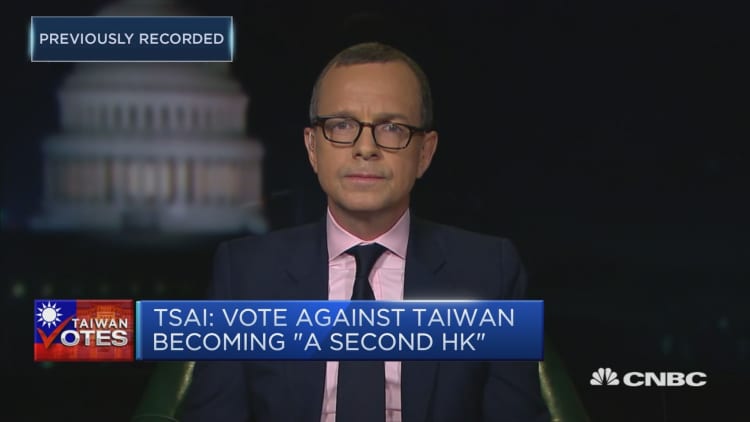
Taiwan heads to the polls on Saturday with the island sitting in the center of a struggle for regional dominance between the United States and China.
"Taiwanese voters, for the first time, are voting between two candidates that have completely different visions of what Taiwan's relationship is with China and the world," said Shirley Lin, Compton Visiting Professor in World Politics at the Miller Center of Public Affairs, University of Virginia.
In the race are incumbent president Tsai Ing-wen from the Democratic Progressive Party (DPP) and Kuomintang (KMT) or Nationalist Party's Han Kuo-yu, also the mayor of Kaohsiung city.
The presidential vote on January 11 is seen as a referendum on Taiwan's identity, sovereignty and Chinese influence. Legislative elections will also be held on the same day, although the race is traditionally focused more on local issues and less on national sovereignty, noted Eurasia Group, the geopolitical consultancy.
Communist China has never ruled over Taiwan, but Beijing claims self-ruled Taiwan as its territory and has never renounced the use of force to achieve "reunification."

Taiwan's relationship with China has cooled significantly since Tsai, an independence-leaning politician, took office in 2016.
And Tsai has set out to steer Taiwan's reliance away from mainland China both economically and in other respects, said Lin.
On the other hand, the KMT's Han "believes that we should integrate more closely with China economically — may not be politically, in order to solve many of Taiwan's socioeconomic problems — and many of his supporters also support unification," said Lin.
The third candidate James Soong is a veteran politician who is the chairman of the smaller People First Party. Soong announced his candidacy in November and is not seen to be posing a serious challenge to Tsai or Han.
Hong Kong factor
Tsai's popularity tanked after she won the 2016 presidential election, but things have been turning around for her since early last year, when she responded forcefully to Chinese President Xi Jinping's aggressive New Year's speech where he said Beijing reserved the right to bring Taiwan under its control, by force if necessary.
Xi has been "a fantastic campaign manager for her," said Rupert Hammond-Chambers, managing director for Taiwan at BowerGroupAsia, a government affairs and public policy consulting firm.

Tsai scored points with the Taiwanese when she "defended the island's democracy and she spoke out clearly about the shortcomings of 'one country, two systems' and the fact that it's a non-starter for Taiwan," noted Hammond-Chambers.
The "one country, two systems" applies to Hong Kong, a former British colony that returned to Chinese rule in 1997, which has seen months of pro-democracy protests as its young people fight to keep out Beijing's growing influence. Under that principle, Hong Kong is given self-governing power, a largely separate legal and economic framework from China, and various freedoms including limited election rights. But citizens say their freedoms have eroded.
Tsai got a further boost in 2019 when she rejected Beijing's policy. "As long as I'm President, 'one country, two systems' will never be an option," she proclaimed on Twitter on June 9, in support of the Hong Kong protests.
What the results will mean
China will have to weigh its next move if Tsai is re-elected, said Hammon-Chambers.
"The Chinese are truly confronted both in Hong Kong and in Taiwan post the Tsai re-election with the complete and utter ending of any discussion about the viability of 'one country, two systems' for Taiwan. That debate as a practical matter is over," said Hammon-Chambers.
The results of the weekend election will have implications for the U.S.-China-Taiwan triangle as "Taiwan has long been seen as important as a proxy for the battle for hegemony between China and the United States in the region," wrote Natasha Kassam and Richard McGregor at Australian think tank, Lowy Institute.
"The geo-strategic implications of China gaining control of Taiwan are nothing less than transformational, as such an event would signal the definitive end of the US-dominated post-war system in what is now the world's most dynamic economic region," said the report published this week.
Home to Apple supplier Foxconn, Taiwan also plays an outsized role in high-tech global supply chains.
If Taiwan is annexed, Beijing would have effective control over some of the world's most cutting-edge technologies held by privately-owned Taiwanese companies, said the Lowy analysts.
Xi could double down if Tsai is re-elected, said Kharis Templeman, an advisor to the Project on Taiwan in the Indo-Pacific at the Hoover Institution at Stanford University.
"Taiwan could then emerge as an important test case for whether the United States can develop a more robust set of diplomatic and economic tools to counter the PRC's rising influence across the Indo-Pacific," said Templeman in a report.

